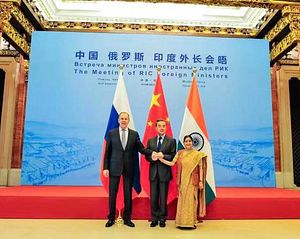On Wednesday, the foreign ministers of Russia, India, and China met for the 16th ministerial meeting of the Russia-India-China (RIC) trilateral in Zhejiang, China. The meeting was the first high-level diplomatic interaction between Indian External Affairs Minister Sushma Swaraj and her Russian and Chinese counterparts, Sergei Lavrov and Wang Yi respectively, since the Tuesday morning airstrike by the Indian Air Force on Pakistani territory.
India is seeking diplomatic support for its position after its strike on Pakistan. On Wednesday, as the RIC was meeting, Pakistan undertook strikes of its own against Indian positions in Indian-administered Kashmir. With the crisis in full swing, the RIC is just one of several forums where India would be looking for support. China, notably, is Pakistan’s “all-weather” diplomatic partner and has shielded Islamabad from international scrutiny in the past.
Somewhat surprisingly, the RIC joint statement, issued at the conclusion of the meeting, showed some advancement that may be in India’s favor on the issue of terrorism. The statement noted that the three ministers “strongly condemned terrorism in all its forms and manifestations” and “called on the international community to strengthen UN-led global counter-terrorism cooperation by fully implementing the relevant UN Security Council (UNSC) resolutions and the Global Counter-Terrorism Strategy in accordance with the Charter of the United Nations and the principles of international law.”
Most important for India, however, was the inclusion of language that the three ministers “stressed that terrorist groups cannot be supported and used in political and geopolitical goals.” Though Pakistan and Jaish-e-Mohammed — the terror group that claimed the February 14 attack on Indian paramilitary personnel that sparked the current crisis — weren’t named, the language implicitly supported India’s position.
Separately, the joint statement called for “those committing, orchestrating, inciting or supporting terrorist acts” to be held to account. The language does not break through a major impasse that has separated India and China, in particular, on Jaish-e-Mohammed: the listing of the group’s leader Masood Azhar as a “global terrorist” under United Nations Security Council resolution 1267. Over several years, China has used a technical hold to prevent his designation.
But, on balance, taking the reality of Chinese and Russian preferences into account, the RIC trilateral statement is probably as good an outcome India could have hoped for. The statement came at a critical time in the ongoing crisis, with New Delhi now considering its possible retaliation for Pakistan’s strikes on Wednesday. If India chooses to press ahead, the crisis may escalate into an all-out war of sorts.
But if India resorts to diplomatic efforts to push back on Pakistan and isolate it, this kind of support might go a long way. China won’t change its strategic posture of support for Pakistan anytime soon, of course, but even Russian support would be valuable for New Delhi‘s diplomatic efforts.
One caveat lies in the strategic value of the RIC joint statement itself. In past years, the statements have reflected positions that have been otherwise not universal among the three countries. For instance, in 2016, India signed onto a Russia-India-China trilateral statement that included language heavily favorable to China’s negotiating position on disputes in the South China Sea, stating that they ought to be “addressed through negotiations and agreements between the parties concerned.” That was in anticipation of the July 2016 arbitral ruling in the case filed against China by the Philippines in 2013. India supported that arbitration process and its result.
In similar terms, the language in the RIC statement may ultimately reflect a hollow signal on China’s willingness to back India — especially at multilateral fora. Nevertheless, Beijing has made its preference for the de-escalation of the ongoing India-Pakistan crisis clear.
































